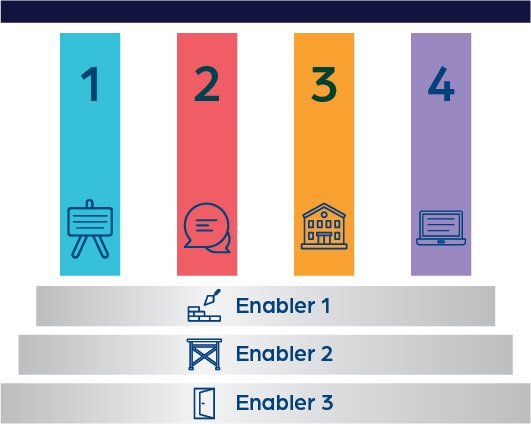What is University for All?
University for All is a whole-institution, evidence-based approach to mainstreaming inclusion in UCD, ensuring that all students feel welcome, belong and are valued. University for All recognises, promotes and values the breadth of talent, experience and contribution of all students, and creates an inclusive educational experience for all. In line with both the UCD and EDI strategies, the University for All initiative embeds inclusion across the university further developing UCD’s capacity to attract, retain and develop our diverse student population.
The principles of Universal Design are a core ethos to our mainstreaming approach. Universal Design is the design and composition of an environment so that it can be accessed, understood and used to the greatest extent possible by all people, regardless of their age, size or disability (Disability Act, 2005). The University for All initiative seeks to engage the entire university community to apply Universal Design to the whole institution and each individual’s day-to-day work: policy, strategy, teaching, learning, assessment, student supports and services, the built campus and the IT infrastructure. Institutional Universal Design capacity is built through professional development training in the form of the Digital Badge for Universal Design and through utilisation of the Unlocking Inclusion Toolkit for Universal Design in Higher Education.
We also have two interconnected Research and Impact projects underway to develop a framework and Digital Badge to support the measurement of the impact of Universal Design on student engagement and success.

University for All Components
University for All is based on rigorous data collection and dissemination mechanisms to enable us to measure progress of this initiative, and to benchmark the participation of under-represented student groups across the entire University. Data is shared regularly through the University Widening Participation Committee, through the annual reports of the Committee and the Who Counts? data report. The University for All Student and Staff Survey captures the qualitative experience of inclusion in UCD.
The University Widening Participation Committee provides strategic oversight and governance of the University for All initiative. A significant portion of the Committee's work focuses on determining quotas for under-represented students into undergraduate programmes in UCD, which is informed by admissions and participation data. Widening Participation Leads develop action plans for their local programme board or unit areas, identifying opportunities to further embed Universal Design.
University for All has a strong collaborative approach and a number of Partnership Programmes have been developed to implement Universal Design at a local level within teaching and learning, student supports and services, the digital infrastructure and physical environments. There are three Partnership Programmes: Faculty Partnership, Professional Staff Partnership and Student Partnership, each employing Universal Design to tackle barriers to inclusion in innovative and creative ways.
Finally, University for All embraces a sectoral partnership and collaboration. The Unlocking Inclusion Toolkit has been developed to support the adoption of the (opens in a new window)ALTITUDE Universal Design Charter in further and higher education institutions. UCD Access and Lifelong Learning have a long established partnership with (opens in a new window)AHEAD. We jointly organise the national rollout of the Universal Design Digital Badges which have been co-developed by us, with widespread support and collaboration from colleagues in further and higher education and training.